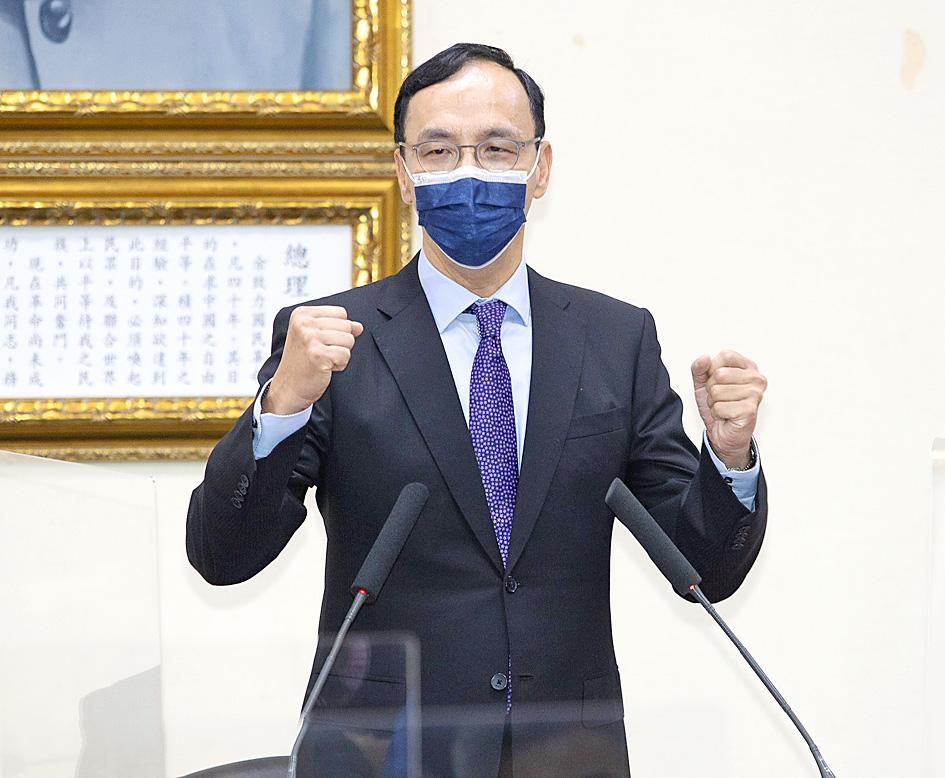The Chinese Nationalist Party (KMT) yesterday vowed to stage a comeback in the US as it unveiled a plaque for its planned liaison office in Washington, which it said is a sign of its resolve to advance its ties with the US.
The plaque, whose design was authorized by KMT Chairman Eric Chu (朱立倫) and the party, is of great importance to the KMT and would be sent to the office for its inauguration, KMT Department of International Affairs director Alexander Huang (黃介正) told a news conference.
The liaison office would be on Pennsylvania Avenue, which connects Capitol Hill and the White House, he said.

Photo: CNA
Huang on Oct. 21 last year said the office would allow those in the US to hear voices from Taiwan besides that of the ruling Democratic Progressive Party, adding that if the KMT were to return to power, the office would serve the interests of both countries.
KMT Culture and Communications Committee director Ling Tao (凌濤) displayed a Republic of China flag, as well as a KMT flag that flew at the joint Washington office of the KMT and the People First Party from 2004 to 2008.
The joint office was closed after former president Ma Ying-jeou (馬英九) took office.
The two flags would be flown again at the office following its reopening, Ling said, adding that they symbolize the heritage of the KMT’s relations with the US.
“The KMT is set to return to Washington with its pragmatic foreign policy to rebuild two-way communication channels,” he said.
Upon becoming KMT chairperson in October, Chu promised to reopen the office, saying that it would restore mutual trust and two-way communication.
There have been no clues as to who is to serve as the KMT’s representative to Washington.
Chu is reportedly planning to attend the office’s inauguration in the spring as part of a wider tour of the US.
The office would be tasked with bolstering two-way communication between the party and US policymakers to mend ties with Washington, the KMT said in November.

The first global hotel Keys Selection by the Michelin Guide includes four hotels in Taiwan, Michelin announced yesterday. All four received the “Michelin One Key,” indicating guests are to experience a “very special stay” at any of the locations as the establishments are “a true gem with personality. Service always goes the extra mile, and the hotel provides much more than others in its price range.” Of the four hotels, three are located in Taipei and one in Taichung. In Taipei, the One Key accolades were awarded to the Capella Taipei, Kimpton Da An Taipei and Mandarin Oriental Taipei. Capella Taipei was described by

The Taichung District Court yesterday confirmed its final ruling that the marriage between teenage heir Lai (賴) and a man surnamed Hsia (夏) was legally invalid, preventing Hsia from inheriting Lai’s NT$500 million (US$16.37 million) estate. The court confirmed that Hsia chose not to appeal the civil judgement after the court handed down its ruling in June, making the decision final. In the June ruling, the court said that Lai, 18, and Hsia, 26, showed “no mutual admiration before the marriage” and that their interactions were “distant and unfamiliar.” The judge concluded that the couple lacked the “true intention of

EVA Airways today confirmed the death of a flight attendant on Saturday upon their return to Taiwan and said an internal investigation has been launched, as criticism mounted over a social media post accusing the airline of failing to offer sufficient employee protections. According to the post, the flight attendant complained of feeling sick on board a flight, but was unable to take sick leave or access medical care. The crew member allegedly did not receive assistance from the chief purser, who failed to heed their requests for medical attention or call an ambulance once the flight landed, the post said. As sick

INDUSTRY: Beijing’s latest export measures go beyond targeting the US and would likely affect any country that uses Chinese rare earths or related tech, an academic said Taiwanese industries could face significant disruption from China’s newly tightened export controls on rare earth elements, as much of Taiwan’s supply indirectly depends on Chinese materials processed in Japan, a local expert said yesterday. Kristy Hsu (徐遵慈), director of the Taiwan ASEAN Studies Center at the Chung-Hua Institution for Economic Research, said that China’s latest export measures go far beyond targeting the US and would likely affect any country that uses Chinese rare earths or related technologies. With Japan and Southeast Asian countries among those expected to be hit, Taiwan could feel the impact through its reliance on Japanese-made semi-finished products and